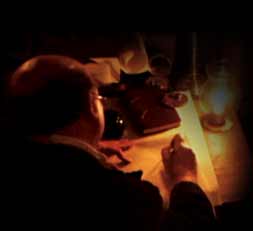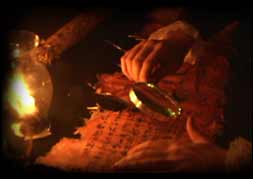
 |
The Salt Lake
Tribune
Date: 08/08/2002
Edition: Final
Section: Utah
Page: E5
Keywords: UT; Films-Movies; Mormon
Church
Subject: Religion and Belief Matter:
Belief (Faith)
Film Challenges LDS Translation
BY PEGGY FLETCHER STACK
A documentary film challenging the translation of
an LDS book of scripture is being shown at several Utah locations this
week.
"The Lost Book of Abraham: Investigating a Remarkable Mormon Claim"
was produced by the Institute for Religious Research, a
non-denominational Christian group in Grand Rapids, Mich. The institute
critiques religious claims of groups such as The Church of Jesus Christ
of Latter-day Saints and Jehovah's Witnesses, among others.
There will be a free showing of the film at Utah Valley State College
today, the University of Utah Friday and Weber State University on
Saturday.
"The Lost Book" begins with the story of how Mormon founder Joseph
Smith bought and translated several Egyptian papyrus scrolls and
fragments in 1835. Smith claimed the scrolls were an original text from
the biblical patriarch Abraham, and his Book of Abraham and became part
of The Pearl of Great Price, one of the faith's scriptures.
Smith's wife, Emma, later sold the collection to a man who in turn
sold it to the Chicago Museum, which was destroyed in the Great Chicago
Fire of 1871.
It was presumed that the papyri were lost, but in the spring of 1966,
11 papyrus fragments as well as Emma Smith's letter certifying that they
had belonged to her husband were discovered at the Metropolitan Museum
of Art in New York. On Nov. 27, 1967, they were returned to the LDS
Church.
In the film, Robert Ritner, associate professor of Egyptology at the
University of Chicago, says that Smith's translation does not match
those of professional linguists. He and other scholars say the book is
an Egyptian book of breathing, not a record of Abraham.
LDS officials and scholars declined to be interviewed for the film,
but it does quote from writings by Mormon Egyptologist John Gee, who
argues that the fragments are "not the portion of the papyri that
contained the text of the Book of Abraham."
Luke Wilson, the film's writer and producer, defends its approach.
"We have tried to bring a level of sensitivity to this kind of work,
I think, with some success," Wilson said Tuesday. "We are trying to have
a constructive dialogue."
Jan Shipps, a non-Mormon who has studied Mormonism extensively and
who is quoted in the film, doubts this film will have any impact on most
LDS faithful.
"This story has been around since 1967 and I assumed it would
undercut Mormon beliefs," Shipps said in an interview from her Indiana
home. "But instead of being like a stone shattering a pane of glass, it
was more like a stone being tossed into a pool of water and dropping to
the bottom."
|

